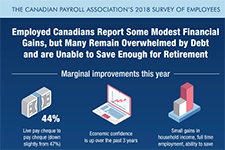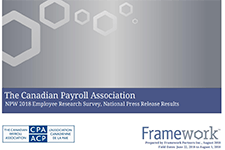Discover financial empowerment resources
Discover financial empowerment resources
This infographic shows results from the 2018 Survey of Employees conducted by the Canadian Payroll Association. It shows some marginal improvements but also some concerns. 44% of Canadians are living paycheque to paycheque, 40% feel overwhelmed by debt, and 72% have saved only one quarter or less...

Working Canadians seem to be making some minor progress towards improving their financial health. But, while 66% report being in a better financial position than a year ago, their debt levels remain high, they chronically undersave for retirement, and put themselves at severe risk in the event of...

For many Canadians, the road to a comfortable retirement is becoming longer and more difficult. A large portion of the working population is living pay cheque to pay cheque, unable to save, and worried about their local economy, according to the Canadian Payroll Association’s eighth annual...
